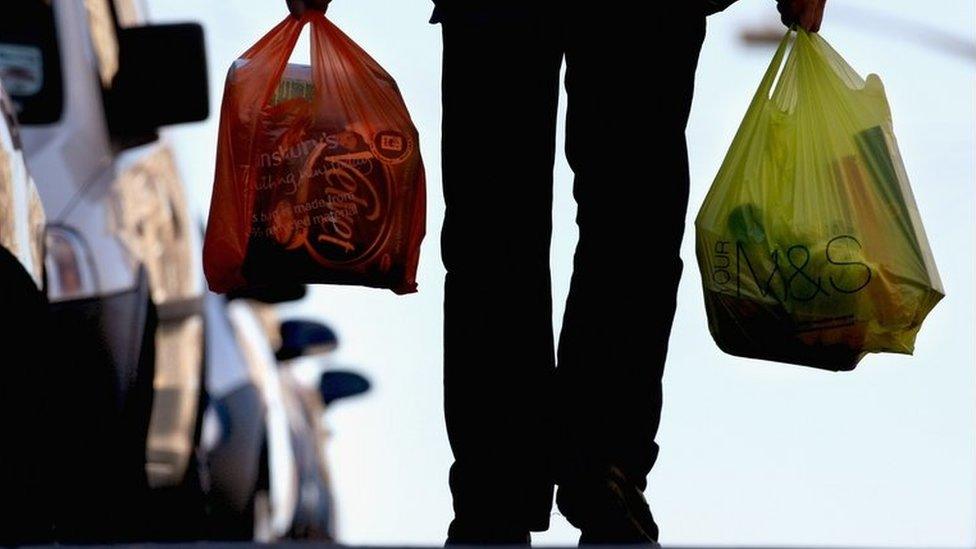Plastic bags: Charge could rise to 10p and be extended to smaller shops
- Published
- comments
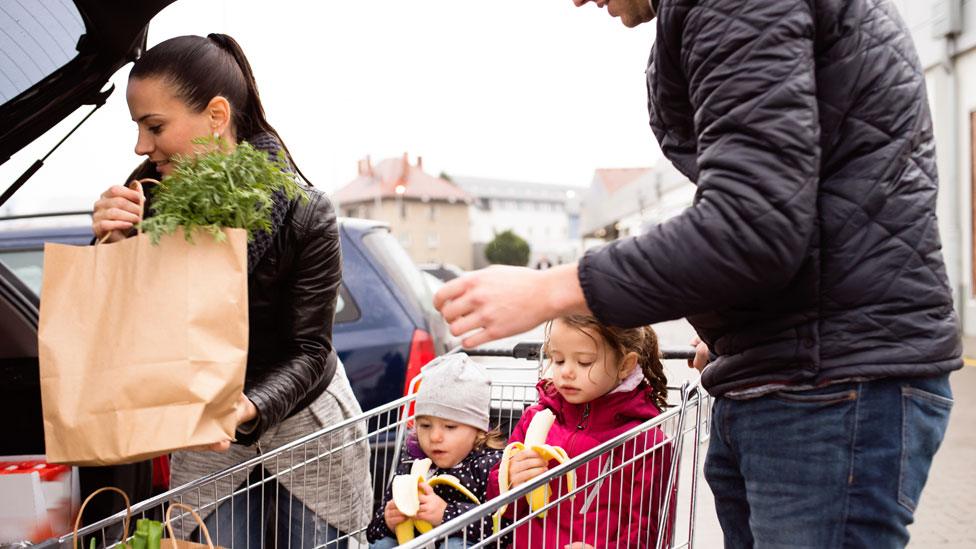
Paper bags can be used as an alternative to plastic
The plastic bag fee in England could rise to 10p - with all shops having to charge, regardless of how big they are.
Since October 2015, customers have had to pay at least 5p for each single-use bag - with all retailers employing more than 250 people made to take part in the scheme.
But now it might be extended to all shops with the charge set at 10p, Prime Minister Theresa May has announced.
The change is part of the government's plan to tackle plastic pollution.
A consultation will be launched later this year, the government said.
Currently, it is estimated that more than three billion bags are supplied by small and medium companies every year.
In Scotland, Wales and Northern Ireland, smaller retailers already charge a minimum of 5p for plastic bags.
Mrs May said: "We have taken huge strides to improve the environment, and the charge on plastic bags in supermarkets and big retailers has demonstrated the difference we can achieve by making small changes to our everyday habits.
"I want to leave a greener, healthier environment for future generations, but with plastic in the sea still set to treble we know we need to do more to better protect our oceans and eliminate this harmful waste."
Campaigners say single use plastic bags take 1,000 years to break down and can be extremely damaging to marine wildlife.
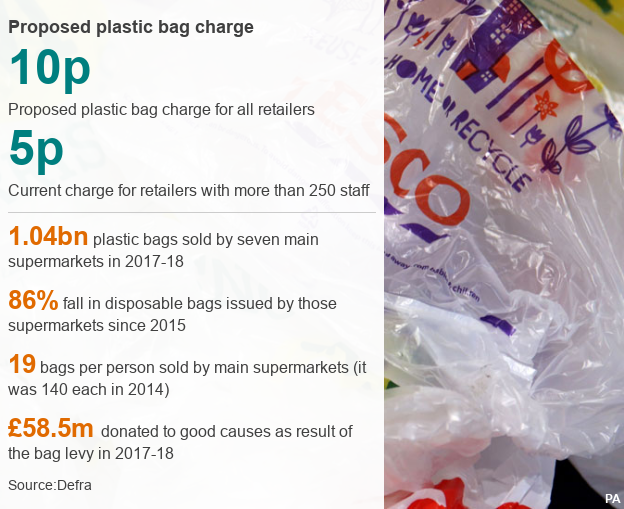
What's happened since the charge was introduced?
The number of single-use plastic carrier bags handed out by supermarkets in England has drastically decreased.
In 2014 - before the charge was introduced - the seven main retailers (Asda, Marks & Spencer, Morrisons, Sainsbury's, the Co-Operative Group, Tesco and Waitrose) handed out the equivalent of 140 plastic bags per member of the population.
In 2016-17, that fell to 24 bags, falling further to 19 bags in 2017-18.
Since the fee was introduced, the number of disposable carrier bags given out by the seven biggest supermarket chains has decreased by 86% overall, according to official figures.
In total, 13 billion plastic bags have been taken out of circulation in the past two years.

Want to find out more about plastics?
What happens to the money raised?
The charge is not a tax, so the money does not go to the government. While retailers are given the choice on what to do with the money, they are expected to give it to good causes.
Between April 2016 and 2017, 4.3p was donated to good causes for every 5p bag sold, according to the two-thirds of retailers who voluntarily gave information about where the money went.
These retailers donated more than £58.5m to good causes in total in that time.
Five ways to break up with plastic
What could change now?
Up until now, it's just been the biggest retailers that have had to charge for single-use plastic bags in England. Smaller businesses have been allowed to charge if they want to, with the Association of Convenience Stores encouraging its members to introduce voluntary charging schemes where practical.
What are people saying about it?
Many of the seven major supermarkets have already stopped selling single-use carrier bags in their stores. Sainsbury's 5p bags are thicker and stronger, so they are not considered to be single use, while Tesco only sells 10p bags for life.
Asda has said it is phasing out single-use plastic bags by the end of the year, and Morrisons started doing this in March.
James Lowman, chief executive of The Association of Convenience Stores, said it had "long campaigned for compulsory plastic bag charging to be extended to all businesses just as it is in Wales and Scotland".
About half of convenience stores already charged for bags voluntarily and most supported a universal charge, he said.
The British Retail Consortium said it was right for the levy to be mandatory and consistent for all shops but it questioned whether the rise to 10p would help.
"We think any further reduction will be marginal as there has been such a major reduction already," a spokesman said.
Environmental campaign group A Plastic Planet said increasing pressure on consumers was the wrong approach.
Founder Sian Sutherland said: "This levy increase unfairly targets consumers while major brands continue to force plastic upon them. The government needs to shift its focus on to them if it is to become a world leader in tackling the plastic problem."
Emma Priestland, plastic pollution campaigner at Friends of the Earth, said increasing charges had proved effective in the Irish Republic (where the levy is 22 cents per bag, external), but added that the government also needed to take action against other sources of plastic, such as coffee cups and straws.

So what does this mean?
Analysis by David Shukman, BBC News science editor
The past few years have seen a blizzard of government announcements about plastic pollution - but it's always worth checking the small print.
The fanfare may be about new measures that are actually coming into force - such as the 5p charge on carrier bags in supermarkets which has genuinely been a major success. Or it could herald the launch of a consultation about whether to introduce new measures - like the plan for a deposit return scheme for plastic bottles.
Or the announcement may simply be declaring that there will in future be a consultation - as with the proposal for a doubling of the charge on bags to 10p and extending it to small stores. Thursday's press release says the PM "confirms" the consultation but adds that it won't be launched until later this year. And if it all happens, will it be worth it?
The 5p charge in the "big seven" supermarkets has led to 13 billion fewer bags being in circulation, the kind of dramatic change seen in the Irish Republic which pioneered action in this area. Extending the charge to smaller shops could cut a further three billion - a welcome step but never massive.
And campaigners point out that other countries are being far more radical about all forms of plastic waste. Kenya, where the announcement was made, is leading the world with jail sentences for anyone caught making or importing plastic bags; the time for Kenyan consultations on plastic has long past.

What else is the government doing?
The government has previously announced a ban on microbeads.
It has already said it wants to ban the sale of plastic straws, stirrers and cotton buds. There are plans too for a deposit return scheme for drinks bottles and cans, to encourage recycling.
- Published19 July 2018
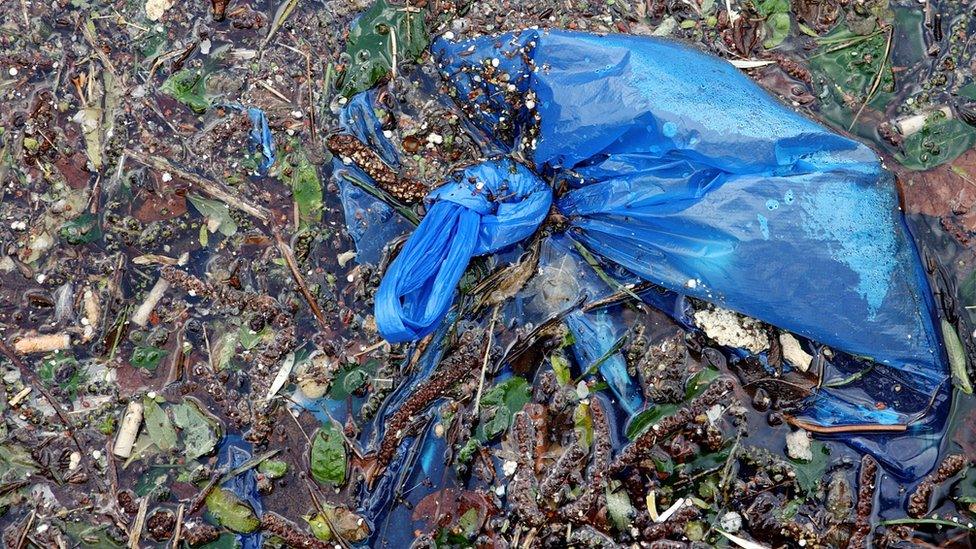
- Published5 April 2018
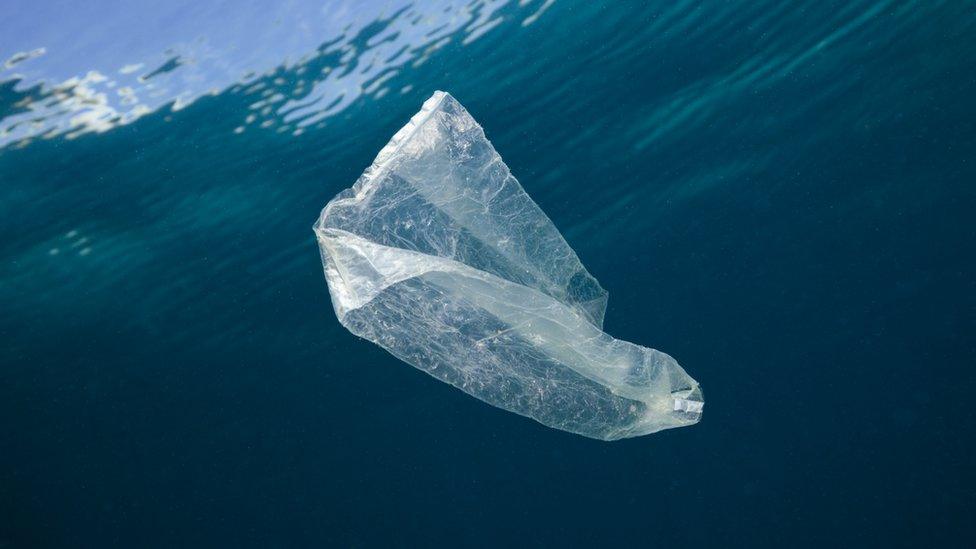
- Published10 January 2018
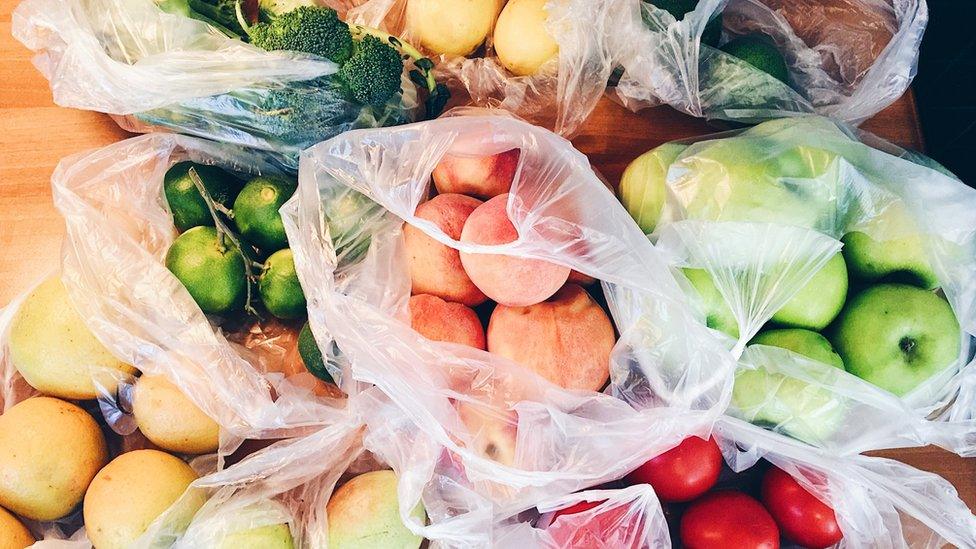
- Published11 January 2018
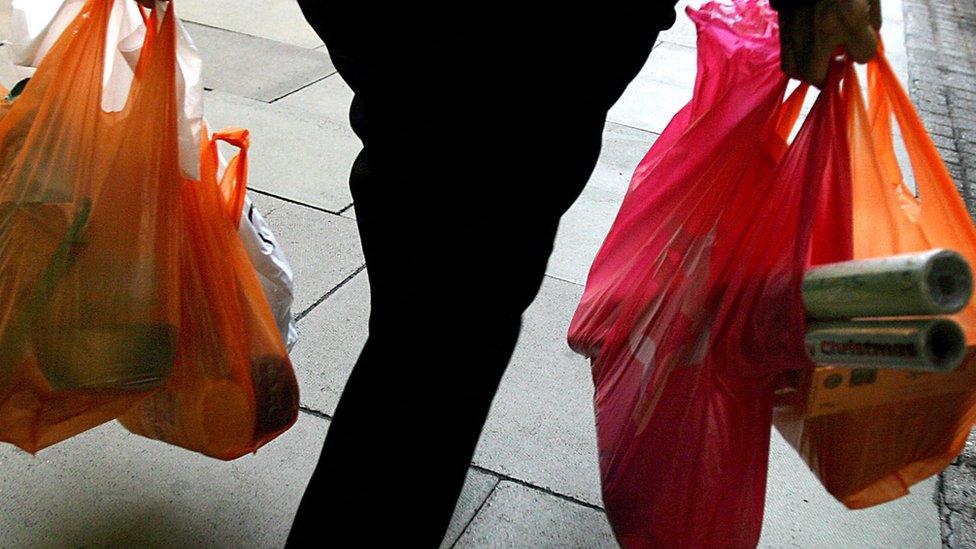
- Published30 July 2016
